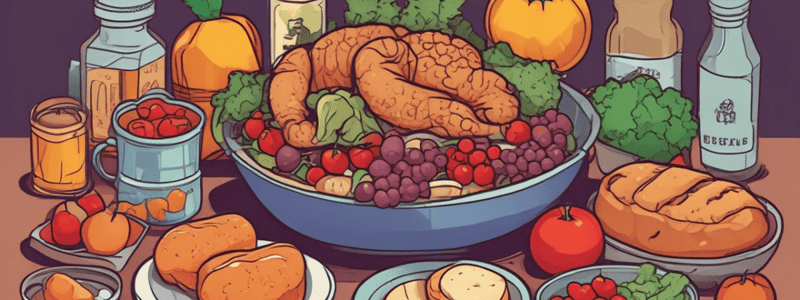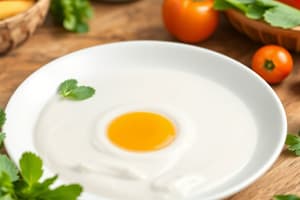Podcast
Questions and Answers
What is one of the main factors that determines your overall food expenditures?
What is one of the main factors that determines your overall food expenditures?
- Where you buy foods and beverages (correct)
- How often you cook
- What you eat at home
- The nutritional quality of your diet
Why are fast foods often more expensive than preparing food at home?
Why are fast foods often more expensive than preparing food at home?
- Because they are high in micronutrients
- Because they are lower in saturated fat
- Because they are more nutritious
- Because someone else is preparing the food for you (correct)
What is a characteristic of fast foods?
What is a characteristic of fast foods?
- They are low in energy density
- They are energy dense and low in micronutrients (correct)
- They are low in added sugars
- They are high in fiber
What is a benefit of buying foods and beverages at supermarkets compared to convenience stores?
What is a benefit of buying foods and beverages at supermarkets compared to convenience stores?
What is one way to trim food costs without sacrificing proper nutrition?
What is one way to trim food costs without sacrificing proper nutrition?
Why is it recommended to prepare food at home instead of relying on commercial outlets?
Why is it recommended to prepare food at home instead of relying on commercial outlets?
What is a learning outcome of this section?
What is a learning outcome of this section?
When were the retail food prices used as examples in this section?
When were the retail food prices used as examples in this section?
What is a money-saving practice when buying apples?
What is a money-saving practice when buying apples?
What is a major advantage of supermarkets compared to convenience stores?
What is a major advantage of supermarkets compared to convenience stores?
Why is produce grown in the United States usually less expensive when it is in season?
Why is produce grown in the United States usually less expensive when it is in season?
Why is buying food in bulk not always a good idea?
Why is buying food in bulk not always a good idea?
What happens to the vitamin C content of produce when it is bruised or becomes wilted?
What happens to the vitamin C content of produce when it is bruised or becomes wilted?
What is the purpose of comparing unit costs of similar food products?
What is the purpose of comparing unit costs of similar food products?
What is an advantage of buying produce from local farmers?
What is an advantage of buying produce from local farmers?
How can you calculate the unit price of a food product?
How can you calculate the unit price of a food product?
Why are frozen or canned fruits and vegetables often less expensive than their fresh counterparts?
Why are frozen or canned fruits and vegetables often less expensive than their fresh counterparts?
Why are prepared foods often more expensive than 'slow foods'?
Why are prepared foods often more expensive than 'slow foods'?
What is a good practice to avoid when buying items marked '3 for $1.00'?
What is a good practice to avoid when buying items marked '3 for $1.00'?
Why are preportioned snack foods usually more costly per ounce than the same foods purchased in larger packages?
Why are preportioned snack foods usually more costly per ounce than the same foods purchased in larger packages?
What can be done to save money and improve diet?
What can be done to save money and improve diet?
What is the benefit of buying a whole chicken instead of a rotisserie-cooked chicken?
What is the benefit of buying a whole chicken instead of a rotisserie-cooked chicken?
What is a benefit of making your own preportioned snacks?
What is a benefit of making your own preportioned snacks?
What should you ignore when comparing package sizes of similar products?
What should you ignore when comparing package sizes of similar products?
Why should you compare the prices of raw and pre-cut fruits and vegetables?
Why should you compare the prices of raw and pre-cut fruits and vegetables?
What should you do when comparing the unit price of organic foods and similar conventionally produced items?
What should you do when comparing the unit price of organic foods and similar conventionally produced items?
What is a benefit of shopping at 'no frills' cash-only grocery stores?
What is a benefit of shopping at 'no frills' cash-only grocery stores?
Why should you plan your meals and snacks before you shop for food?
Why should you plan your meals and snacks before you shop for food?
What is the purpose of the 'sell by' date on packages of perishable foods?
What is the purpose of the 'sell by' date on packages of perishable foods?
Why are store brand items often less expensive than brand-name items?
Why are store brand items often less expensive than brand-name items?
What is the advantage of buying canned fish instead of fresh fish?
What is the advantage of buying canned fish instead of fresh fish?
Why should you avoid shopping for groceries when you are hungry?
Why should you avoid shopping for groceries when you are hungry?
What is a recommended way to reduce the cost of coffee?
What is a recommended way to reduce the cost of coffee?
What is the benefit of freezing perishable foods such as shredded cheese and fluid fat-free milk?
What is the benefit of freezing perishable foods such as shredded cheese and fluid fat-free milk?
Why should you read food product labels for storage information?
Why should you read food product labels for storage information?
What is a recommended way to reduce food waste?
What is a recommended way to reduce food waste?
Why is it recommended to have at least one vegetarian meal a week?
Why is it recommended to have at least one vegetarian meal a week?
What is the benefit of growing your own herbs?
What is the benefit of growing your own herbs?
Flashcards are hidden until you start studying
Study Notes
Saving Money on Food
- To eat well for less, analyze your food buying practices and make a few changes.
- Where you buy foods and beverages and what you decide to purchase are major factors in determining your overall food expenditures.
Comparing Food Prices
- Compare unit costs of similar food products to determine the best value.
- Use a small calculator to compare prices.
- Determine the unit price of the cereal in each box by dividing the cost of the entire package by the number of units of food it contains.
Supermarkets
- Supermarkets offer a wide variety of prepared foods, including deli items, frozen entrées, and fresh cut-up fruit packaged in single-serving plastic bags or cups.
- These "fast foods" are convenient, but food processing and packaging add to the cost of food.
- To save money and improve your diet, rely less on prepared foods and more on "slow foods"—foods that require some of your time and effort to prepare.
Buying in Bulk
- Buying food in bulk is a bargain only if you can use the item before it spoils.
- Consider buying a raw whole chicken and cutting it into parts or a whole chicken breast and removing the skin and bones.
Fresh Fruits and Vegetables
- Eating more fruits and vegetables is the natural way to add micronutrients, fiber, and phytochemicals to your diet.
- Compare the price of pre-cut, pre-packaged fruits and vegetables with that of their raw counterparts.
- Produce that is grown in the United States is usually less expensive when it is in season and more plentiful.
Shopping Wisely
- Use unit pricing to compare costs of similar packaged products.
- Be wary of appealing offers that are not bargains.
- Compare the unit price of organic foods and similar conventionally produced items.
- Make your own preproportioned snacks.
- Use coupons when purchasing brand-name items.
- Limit your carbonated soft drink, commercially prepared coffee, energy drink, and bottled water purchases.
Food Storage
- Check "sell by," "best if used by," or "use by" dates on packages of perishable foods such as eggs and dairy products.
- Read food product labels for storage information.
- Many products must be refrigerated after opening to delay spoilage.
Food and Nutrition Tips
- Avoid shopping for groceries when you are hungry.
- Be wary of buying food items that are displayed near or along checkout aisles.
- Many perishable foods, such as shredded cheese and fluid fat-free milk, can be frozen.
- Consider carrying a small thermos of coffee in your backpack.
- Canned beans are often sold in large cans that may be cheaper per ounce than beans in smaller cans.
- Grow your own herbs for fresh seasonings.
- Share potluck dinners with friends.
- Prepare a shopping list to help avoid needless or impulse purchases.
Studying That Suits You
Use AI to generate personalized quizzes and flashcards to suit your learning preferences.




